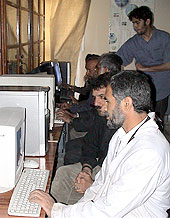

| ADVISORY PROJECTS |
| SUPPORT TO INSTITUTIONS |
| SURVEYS |
| EMERGENCY CONSERVATION WORKS |
| PROJECTS AWAITING SUPPORT |
| Human resources constraints
are one of the main challenges in today's Afghanistan. During the
past two decades the intelligentsia has fled, the educational system
has collapsed and the salaries of civil servants have become abysmally
insufficient. All this makes it difficult to motivate governmental
staff. Qualified Afghans present in the country typically "desert"
their posts in their fields of specialization to work for international
NGOs with better salaries. This situation is especially dramatic in the under-funded field of cultural heritage. It is agreed upon by all the stakeholders in this field that capacity-building of Afghan professionals in cultural heritage preservation is a priority. The Afghan professionals working in this field have conveyed to us their need of training. Rather than new and sophisticated conservation techniques or updates on scientific or historical knowledge during the past 25 years, what they need firstly is to refresh the basic principles of the preservation of cultural properties. And we must not forget that there are other skills to be learned before hand, such as languages to communicate better with the different foreign missions that come to train them or to be able to read specialized texts in other languages. Different government institutions have approached SPACH in order to get training in numerous disciplines. These institutions are the National Museum of Afghanistan, the Historical Monuments Department, the Academy of Sciences, the Institute of Archaeology, the History and Archaeology Departments of the Faculty of Social Sciences, and the Ministry of Information and Culture itself with more than 30 offices throughout the country. The needs are huge and more funding is needed to address this problem. At the request of Mr. Masoudi, the Kabul Museum director, SPACH allocated a modest sum to train the museum staff in English language and computer skills. The results are very satisfactory after half a year, but this contribution barely even scratches the surface of what is needed. |
|
Photo: A. Rodriguez. 2004 |
English
Courses in the National Museum of Afghanistan [2003-2004] Thanks to a generous grant of $1,000 provided by the Australian writer Christopher Kremmer, SPACH was able to organize a one-year English course that started in the museum in October 2003. On a daily basis 22 members of the museum staff take part in this course. The course has two levels, one for beginners and a second for advanced students. The museum staff are studying hard. They know the importance of learning a second language that will facilitate the communication with the missions that come from abroad to train them in conservation techniques. Computer Courses in the National Museum of Afghanistan [2003-2004] At the request of the Kabul Museum director, a computer course was organised by SPACH from October 2003 up to the present. SPACH donated three second-hand computers and planned a personalised course for six members of the staff chosen by the Museum director. During the first six months the students learned to deal with Windows and then the classes became much more personalised and targeted specific skills such as Word in Dari for administrative staff, multimedia applications for photographic staff and databases for library staff. |
